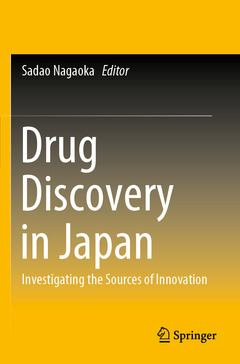Drug Discovery in Japan, 1st ed. 2019 Investigating the Sources of Innovation

This book analyzes the drug-discovery process in Japan, based on detailed case studies of 12 groups of 15 innovative drugs. It covers the first statin in the world up to the recent major breakthrough in cancer therapy, the recent immune checkpoint inhibitor, the scientific discovery for which a 2018 Nobel Prize in Physiology or Medicine was awarded to Prof. Tasuku Honjo, Kyoto University. The book shows the pervasive high uncertainty in drug discovery: frequent occurrences of unexpected difficulties, discontinuations, serendipities, and good luck, significantly because drug discovery starts when the underlying science is incomplete. Thus, there exist dynamic interactions between scientific progress and drug discovery. High uncertainty also makes the value of an entrepreneurial scientist high. Such scientists fill the knowledge gaps by absorbing external scientific progress and by relentless pursuit of possibilities through their own research, often including unauthorized research, to overcome crises. Further, high uncertainty and its resolution significantly characterize the evolution of competition in the drug industry. The patent system promotes innovation under high uncertainty not only by enhancing appropriability of R&D investment but also by facilitating the combination of knowledge and capabilities among different firms through disclosure. Understanding such a process significantly benefits the creation of innovation management and policy practices.
Foreword.- Acknowledgement.- Chapter 1: Introduction.- Chapter 2: Compactin.- Chapter 3: Pravastatin (Pravachol, Mevalotin).- Chapter 4: Rosuvastatin(Crestor).- Chapter 5: Leuprorelin (Leuplin, Lupron, Viadur).- Chapter 6: Oflaxacin and levofloxacin (Tarivid/Cravit).- Chapter 7: Tamsulosin (Harnal, Flomax, OMNIC).- Chapter 8: Pranlukast (Onon).- Chapter 9: Tacrolimus (Prograf).- Chapter 10: Pioglitazone (Actos, Glustin).- Chapter 11: Donepezil (Aricept).- Chapter 12: Candesartan (Blopress, Atacand).- Chapter 13: Tocilizumab (Actemra,Ro-actemra).- Chapter 14: Nivolumab (Opdivo).- Chapter 15: Sources of innovation of drug discovery in Japan and its implications.
Dr. Sadao Nagaoka is a Professor of economics at Tokyo Keizai University (Japan). Before this position, he was a professor at the Institute of Innovation Research of Hitotsubashi University (Japan). He has been the Program Director for research on innovation in the Research Institute of Economy, Trade and Industry (RIETI). He worked in the MITI, the World Bank and in the OECD. He has been an economic advisor for the JPO and was a member of the Economic and Scientific Advisory Board of the EPO. He has a Ph.D. in Economics from Massachusetts Institute of Technology. His scientific interests are economics of innovation, especially R&D, intellectual property, standards and science. His recent publications appeared in Journal of Economics & Management Strategy, International Journal of Industrial Organization, Research Policy, Economics of Innovation and New Technology, Journal of Technology Transfer, Journal of the Japanese and International Economies and the US National Academies.
Date de parution : 11-2020
Ouvrage de 333 p.
15.5x23.5 cm
Date de parution : 11-2019
Ouvrage de 333 p.
15.5x23.5 cm
Disponible chez l'éditeur (délai d'approvisionnement : 15 jours).
Prix indicatif 116,04 €
Ajouter au panierThème de Drug Discovery in Japan :
Mots-clés :
Drug discovery; breakthrough; uncertainty; delegated initiative; competition; Statin; Opdivo
